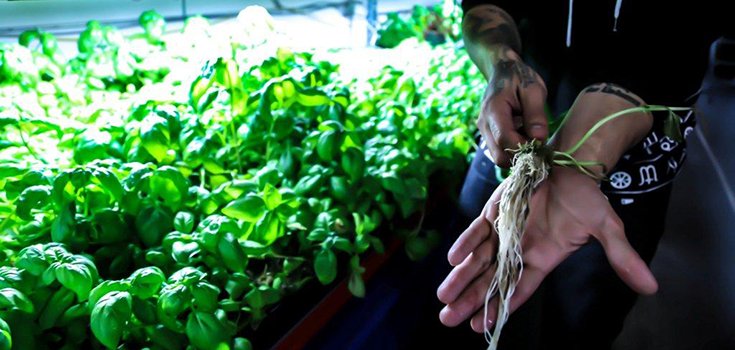This City is Home to the 1st Vegan-Certified Vertical Farm in the U.S.

If you’ve ever been to South Philadelphia, farming probably doesn’t leap into your mind. It’s kind of a rough place. But in a small warehouse, that side of the city is teeming with life, thanks to vertical farming.
Metropolis Farms, the first indoor hydroponic vertical farm in Philadelphia, cranks out fresh, organic food year-round to local grocery stores and restaurants, and it is also the first vegan-certified farm in the United States, and the only known vertical farm to operate on the 2nd floor of a building.
Vegan farms don’t use pesticides, herbicides, animal manure, or animal bi-products. Metropolis is certified under the rigorous standards of the American Vegetarian Association. [1]
Read: 8 Proof We Don’t Need GMOs to Feed the World

Whew! Pretty impressive.
Metropolis Farms is the brainchild of Lee Weingrad, a former marijuana grower, and Jack Griffin, a former Wall Street banker. The odd couple hopes their endeavor will change the face of urban farming and the produce industry, as a whole.
“Most produce is coming from thousands of miles away. We’d like to have a farm in each neighborhood.”
“The innovation here is density, as well as energy and water conservation. We can grow more food in less space using less energy and water. The result is that I can replace 44,000 square feet with 36 square feet. When you hear those numbers, it kind of makes sense.”
Not only that, but Metropolis says it uses 98% less water than traditional farms by filtering and recycling water after use.

Griffin is partnering with the regional supermarket chain NetCost Market this year to open a 100,000-square-foot vertical farm in Northeast Philadelphia, too. In the spring, 2 additional farms will be built in Chicago. Griffin says that vertical farms like his are necessary to feed an ever-growing population:
“Think of how many buildings have spaces available. These solutions have to happen. There aren’t enough farms.” [2]

These indoor, urban growing centers prevent crops from drying out in the hot sun, and protect them from pollution, bugs, and – maybe best of all – pesticides and herbicides. Any bugs that show up at Metropolis Farms are gobbled up by carnivorous plants, explains Lee Weingrad, VP of operations:
“I started growing these plants as a hobby and then I incorporated them into the farm because it attracts the fruit flies, gnats and ants. There is a nectar on the leaves that attracts the bugs, and then they get digested by the acid that is secreted by the plant. The plants live off the nutrients of the bugs, so it’s a cyclical system that works phenomenally.” [3]
And the fact that Metropolis Farms is 100% vegan means that you can enjoy the fruits of its labor with confidence. Griffin points out:
“According to the CDC [Centers for Disease Control], green leafy vegetables grown in manure is one of the top sources of food poisoning.”
Griffin believes Metropolis has set an example for how we might be able to continue to feed the world, despite less and less water and land to work with.
He says:
“My vision is to have communities start to embrace and use our open source technology to create small farms everywhere so that people can enjoy fresh produce year round at a fraction of the cost and with lower energy consumption than traditional farms.”
A photo posted by Metropolis Farms (@metropolisfarms) on
Sources:
[1] EcoWatch
[2] Philly.com
Featured image credit: Jason Sherman

I’m pretty sure Vegan/Vegetarianism is a CIA-type fabricated construct to get people away from consuming the meat. Meat consumption has it’s obvious benefits. It’s the cooking of meat that’s bad. Of course, ensure any meat you consume is from clean and natural origins.
The effort to shift people away from meat has to do with degrading the health of and weakening the population. People should only avoid meat for certain periods such as cleansing. Otherwise, meat should not be avoided and should be minimally cooked. Cooked meat is the most difficult for the digestive system to handle.